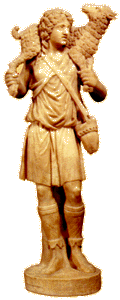
The Roman Dacians' Christianization

A brief history
In his "History of the Church", the bishop Eusebiu from Cezareea (Palestine) wrote that it was the Saint Apostle Andrew spread Christ's ideas in the Pontic Dacia, the
Scythia Minor Roman province, that corresponds to the Romanian province of Dobrogea (located in the south-eastern part of Romania1). A series of other testimonies of the Holy Parents of the antiquity subscribe to that; even in the
Epistle to Coloseni (III, 11), Saint
Paul himself says: "There where there's no more Jew, no circumcision, no barbarian, or Scythian, no slave or freeman, but only Christ in everything and in everyone ".
Some carols and folk creations from Dobrogea and the left shore of the Prut, also testify to Christianisation of the Pontic Dacia by Saint Andrew , all reminding of his passing on these lands. A
few toponyms like Saint Andrew's Cave or Saint Andrew's Rivulet attest the same thing. Considering all these, we can state that the Romanian Christianity is of apostolic origin (the 1st century AD).
There are no positive literary, historical or archaeological testimonies2
regarding the circulation of Christianity on the north shore of the Danube from the 1st to the 3rd century. Thinking of the commercial relations of the Dacians with the economic centres from Asia, Syria, Macedonia, the Greek islands Tracia, Greece and Palestine, where Christianity was already circulating, we can suppose that the preaching of Christianity had been heard in Dacia as early as the end of the 1st century. On the other hand, among the colonists brought in Dacia Traiana many Christians could be found. This is a testimony of Tertulian
3 who, in "Adversus Iudaeos", supports the idea that the new religion was known on the left shore of the Danube even before the Aurelian retreat in 271-275 AD. The Christians were generally recruited from cities ;
it is known that the new religion was first heard in towns and only later in villages and that is only because of the rural conservatism. The Latin word "paganus" that became "pagan"4
in Romanian designated the inhabitant of a "pagus", that meant a village, inhabitant that was not Christianised. In Dacia there were brought many military units -
legions and auxiliary troops.There are testimonies to the existence of Christianised soldiers in the Roman army. During the persecution of Dicletian and Liciniu at the beginning of the 4th century, the Roman soldiers of Scythia Minor suffered
because of their belief in Christ, too. At the end of the military probation that lasted 25 years, the men discharged were given the name of "veteranus" - word from where the Romanian term "batran" evolved.
They settled in Dacia where they received a plot of land; there they got married and, if they were Christians, they formed Christian families. So the main sources of the circulation of Christianity in Dacia Traiana before the Aurelian retreat
were the Roman legionnaires and colonists5. After the year 275, the entering of Christianity in the former Roman province was made easier.
1 "
When the Saint Apostles and disciples of our Saviour spread all over the inhabited world, Toma, according to the tradition, came into "Andrei Scitia" […]" 2
The absence of epigraphic and archaeological evidence is due to the fact that the new religion was seen in the Roman empire as an "illicit" religion until the Milan Edict in 313, so the Christians were poor people that could not build such monuments.
3 ."[…] For in whom else people confided ? Different nations from the Gaels' provinces and the British regions […]; and those of the Dacians, Germans, Scythians […]" 4
Simultaneously with this there circulated in some parts of the country the Latin derivative "pagan" brought by the Slaves, word that in Moldavia meant "ugly, ungainly, vicious" and in Transylvania "terrible". 5
Some opinions encourage the idea of the circulation of Christianity through the missionaries that came from the south of the Danube. But it is not the case of an official missionarism, like in other countries, but of a cultivation of the word of Christ from man to man by ardour, love and personal example. And any hypothesis of a western missionarism is out of the question because, if it had been true, we would have borrowed Christian terms of western origin - terms that do not exist in Romanian.

